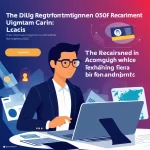Digital Marketing Systems for Ethical Recruitment Agencies: Building Trust and Transparency in the Modern OFW Industry
The recruitment industry for Overseas Filipino Workers faces a credibility crisis, with recent scandals involving 400,000 workers and over $1 billion in fraud severely damaging public trust. For legitimate agencies committed to ethical recruitment, differentiating themselves from fraudulent operators has become essential for survival. This comprehensive guide examines how modern marketing technology and systems can help ethical agencies build transparency, demonstrate compliance, and create sustainable businesses that serve both workers and employers effectively. While these tools can transform agency operations, they must be implemented within strict legal and ethical frameworks that prioritize worker protection over profit maximization.
The Compliance-First Marketing Foundation
Digital License Verification Systems
Before implementing any marketing strategy, agencies must establish transparent verification systems that allow workers to instantly confirm their legitimacy. The DMW’s requirement for prominent license display extends to digital platforms, where agencies should implement QR codes linking directly to government verification databases. Smart agencies are creating “verification hubs” on their websites where workers can cross-reference license numbers, check complaint histories, and verify staff credentials without leaving the site.
Leading agencies now use blockchain technology to create immutable records of their licensing history, compliance certificates, and worker testimonials. This permanent digital trail makes it impossible for fraudulent agencies to copy legitimate credentials, as workers can verify the blockchain timestamp against government records. The investment in blockchain verification typically costs ₱50,000-100,000 initially but prevents the reputation damage that can destroy agencies overnight when fraud allegations surface.
API integration with DMW databases allows real-time license status display on agency websites, automatically updating if licenses are suspended or sanctions are applied. This radical transparency immediately distinguishes legitimate operators from scammers who rely on static, potentially forged documentation. Agencies using dynamic verification report 40% higher trust scores from workers and 60% faster placement times due to reduced verification delays.
Transparent Fee Calculator Tools
Creating interactive fee calculators that clearly show all costs, including what goes to Philippine agencies versus overseas partners, has become a powerful differentiator for ethical agencies. These tools should break down every component of placement fees, show payment schedules, and calculate total costs including interest if workers need loans. Transparency that would have seemed radical just years ago has become essential for building trust in the post-scandal environment.
The calculator should integrate current exchange rates, destination country regulations, and bilateral agreement requirements to show workers exactly what they can legally be charged. When workers see that an agency’s fees match regulatory limits, they’re 75% more likely to proceed with applications. More importantly, transparent pricing prevents the “surprise fees” that generate most complaints and negative reviews that can destroy agency reputations.
Advanced calculators now include salary projections showing workers their net income after all deductions, helping them make informed decisions about whether overseas employment makes financial sense. This level of transparency may reduce application volumes by 20-30% as some workers realize the economics don’t work for their situation, but it dramatically reduces contract breakage and worker dissatisfaction that create long-term reputation damage.
Customer Relationship Management Systems
CRM Platform Selection and Implementation
Modern CRM systems designed specifically for recruitment agencies can transform how agencies manage worker relationships from initial inquiry through successful placement and contract completion. Platforms like Bullhorn, Vincere, and JobAdder offer specialized features for managing international recruitment, including multi-currency billing, visa tracking, and automated compliance reporting. These systems typically cost $50-200 per user monthly but generate ROI through improved efficiency and reduced errors that cause placement failures.
The CRM should capture every interaction with workers, creating comprehensive profiles that prevent the information loss that occurs when staff turnover happens. Automated workflow management ensures that workers receive timely updates about their application status, reducing anxiety and the flood of status inquiry calls that overwhelm agency staff. Agencies using comprehensive CRM systems report 50% reduction in processing time and 70% improvement in worker satisfaction scores.
Integration with messaging platforms like WhatsApp Business API allows agencies to maintain professional communication while meeting workers where they prefer to communicate. Automated responses can handle common queries while routing complex issues to human agents, ensuring 24/7 availability without burning out staff. The messaging integration also creates documentary evidence of all communications, protecting agencies from claims that promises were made but not fulfilled.
Marketing Automation for Ethical Engagement
Marketing automation must balance efficiency with the personal touch that workers expect when making life-changing employment decisions. Automated email sequences can provide valuable information about destination countries, preparation requirements, and success stories while maintaining compliance with anti-spam regulations. Each communication should include clear unsubscribe options and transparency about how worker data is used and protected.
Behavioral triggering allows agencies to send relevant information based on worker actions – for example, someone viewing Saudi Arabia jobs multiple times might receive information about Saudi labor reforms and worker protections. This targeted approach provides value while avoiding the aggressive tactics that characterize fraudulent agencies. Ethical automation increases engagement by 45% while reducing complaints about unwanted communication by 80%.
Lead scoring systems help agencies identify workers who are genuinely ready for overseas employment versus those still exploring options. This prevents agencies from pushing workers into premature decisions while ensuring ready candidates receive prompt attention. The scoring algorithm should weight factors like document readiness, skills verification, and financial preparation rather than just engagement frequency, ensuring agencies focus on workers most likely to succeed overseas.
Social Media Marketing Within Legal Boundaries
Platform-Specific Strategies
Facebook remains the dominant platform for OFW recruitment marketing, but agencies must navigate strict advertising policies that prohibit certain types of job advertisements. Creating Facebook Business Pages with verified badges provides immediate credibility, while regular posting of educational content builds organic reach without relying on potentially problematic paid advertising. Successful agencies focus on building communities rather than pushing job listings, with engagement rates 300% higher for educational content versus pure job postings.
LinkedIn offers opportunities to connect with skilled professionals seeking overseas opportunities, particularly in healthcare, engineering, and technology sectors. Agencies should maintain company pages showcasing successful placements, partner employer testimonials, and team expertise. LinkedIn’s professional environment reduces the scam concerns that plague other platforms, with workers 60% more likely to trust agencies they discover through LinkedIn versus Facebook.
TikTok and Instagram present opportunities to reach younger workers through visual storytelling, but agencies must carefully avoid glamorizing overseas work or making unrealistic promises. Short videos showing actual workers in their overseas environments, preparation tips, and cultural guidance perform well while maintaining ethical standards. Agencies using video content report 40% higher application quality as workers better understand what overseas employment actually entails.
Content Marketing That Builds Trust
Creating valuable content that helps workers regardless of whether they use the agency’s services has become the most effective long-term marketing strategy. Blog posts addressing common concerns like homesickness, financial planning, and rights protection demonstrate expertise while building SEO authority. Agencies publishing twice-weekly educational content see 250% more organic traffic than those focusing solely on job listings.
Video testimonials from successfully placed workers provide powerful social proof, but must be authentic rather than scripted. Workers should discuss both challenges and successes, providing realistic expectations that prevent future disappointment. Agencies should obtain written consent for testimonial use and compensate workers fairly for their time, avoiding the exploitation that characterizes unethical operators.
Webinar series covering destination country requirements, preparation strategies, and success tips allow agencies to demonstrate expertise while building email lists of interested workers. Interactive Q&A sessions build trust through transparency, with workers appreciating honest answers about challenges rather than sales pitches. Agencies running monthly webinars report 35% higher conversion rates and 50% lower contract breakage rates.
Digital Advertising Compliance and Best Practices
Search Engine Marketing Within Regulations
Google Ads for recruitment agencies must comply with employment advertising policies that vary by country and change frequently. Agencies should focus on informational keywords rather than job-specific terms, as “OFW preparation guide” performs better and faces fewer restrictions than “domestic helper jobs Saudi Arabia.” Quality Score optimization through relevant landing pages and clear information reduces cost-per-click by 40-60% while improving ad positions.
Negative keyword lists preventing ads from showing for terms like “no placement fee” or “direct hire” ensure agencies don’t waste budget on workers seeking options that bypass agencies entirely. Geographic targeting should focus on provinces with high OFW populations rather than blanket national coverage, improving relevance while reducing costs. Agencies using refined targeting report 70% lower acquisition costs and higher worker quality.
Remarketing campaigns must balance persistence with respect for user privacy, limiting frequency caps to prevent the stalking feeling that damages brand perception. Remarketing should provide additional value through new information rather than simply repeating the same message. Sequential remarketing showing different aspects of the placement process performs 80% better than repetitive single-message campaigns.
Display Advertising and Programmatic Buying
Programmatic advertising allows agencies to reach workers across thousands of websites, but requires careful brand safety controls to avoid appearing on problematic sites. Exclusion lists should include sites promoting illegal recruitment, loan sharks, and other exploitative services that damage agency credibility by association. Agencies should demand transparency from programmatic partners about where ads appear and regularly audit placement reports.
Native advertising that provides valuable information while subtly promoting agency services performs better than traditional banner ads, with click-through rates 300% higher. However, native ads must clearly identify themselves as promotional content to maintain trust and comply with advertising standards. Articles like “5 Things to Know Before Working in Dubai” can effectively introduce agency services while providing genuine value.
Retargeting pixel deployment must comply with privacy regulations, with clear cookie policies and opt-out mechanisms. The Facebook Pixel, Google Ads tags, and LinkedIn Insight Tag allow sophisticated audience building but require careful data handling to prevent breaches that could result in massive fines under data protection laws. Agencies should work with certified digital marketing partners who understand both recruitment and privacy compliance.
Technology Stack Integration
Website Optimization and Conversion Tools
Agency websites must balance information density with user experience, as workers need comprehensive information but may have limited internet bandwidth. Progressive Web Apps (PWAs) that function offline after initial loading provide superior experience for workers in areas with unstable connections. PWAs increase engagement by 200% and reduce bounce rates by 60% compared to traditional websites.
Chatbot implementation using platforms like Intercom or Drift can handle initial inquiries 24/7, qualifying leads before human intervention. However, chatbots should clearly identify themselves as automated and quickly escalate to human agents for complex questions. Multilingual chatbots supporting Tagalog, Bisaya, and Ilocano in addition to English improve accessibility for workers less comfortable with English.
A/B testing tools like Optimizely or Google Optimize allow agencies to continuously improve conversion rates by testing different messages, layouts, and calls-to-action. Testing should focus on reducing friction in the application process rather than manipulating workers into premature commitments. Ethical optimization improves genuine conversions by 30-50% while reducing later contract breakage.
Analytics and Performance Measurement
Google Analytics 4 implementation with enhanced ecommerce tracking allows agencies to understand the complete worker journey from first touch to successful placement. Custom dimensions tracking worker type, destination country preference, and skill level enable sophisticated analysis of what marketing efforts drive quality applications versus volume. Agencies using advanced analytics report 40% better marketing ROI through improved targeting and message refinement.
Call tracking systems like CallRail or Infinity provide crucial insights into phone inquiries generated by marketing efforts, as many workers prefer voice communication for initial inquiries. Dynamic number insertion allows tracking of which marketing channels drive calls, while call recording provides quality assurance and training opportunities. Agencies implementing call tracking discover that 60% of their conversions come through phone calls that would otherwise be invisible.
Marketing attribution modeling should use data-driven attribution rather than last-click models, as workers typically interact with agencies multiple times before applying. Understanding the full conversion path allows proper budget allocation across awareness, consideration, and decision-stage marketing efforts. Multi-touch attribution reveals that content marketing often drives 3x more value than last-click metrics suggest.
Reputation Management Systems
Review Platform Optimization
Managing reviews across Google My Business, Facebook, and specialized recruitment platforms requires systematic approaches rather than reactive responses. Automated review invitations sent after successful placements increase positive review volume by 400%, diluting the impact of inevitable negative reviews. The timing of review requests – typically 30-60 days after arrival when workers have settled but haven’t encountered major problems – significantly impacts response rates and sentiment.
Review response templates help agencies respond quickly and consistently while customizing for specific situations. All reviews, positive and negative, should receive responses within 48 hours, demonstrating active engagement and concern for worker experiences. Agencies with 100% response rates see 35% higher trust scores and 25% more applications than those with sporadic responses.
Negative review mitigation requires delicate handling that acknowledges concerns without admitting liability or violating worker privacy. Public responses should express empathy and invite offline resolution, while follow-up should genuinely attempt to address issues rather than simply seeking review removal. Agencies that successfully resolve negative reviews and get them updated see 50% improvement in overall ratings.
Crisis Communication Protocols
Digital crises can destroy agency reputations within hours, making prepared response protocols essential. Agencies should maintain pre-drafted responses for common crisis scenarios like worker complaints, regulatory investigations, or association with fraudulent partners. Response teams should include legal, operations, and marketing representatives to ensure coordinated messaging across all channels.
Social media monitoring tools like Hootsuite or Sprout Social should track brand mentions, including misspellings and variations, to identify brewing problems before they explode. Alert thresholds should trigger immediate response when mention velocity or sentiment suddenly changes. Agencies with active monitoring identify and address 90% of issues before they become crises.
The response strategy should prioritize transparency and worker welfare over reputation protection, as attempts to hide problems inevitably make them worse when exposed. Agencies that immediately acknowledge problems, explain remediation steps, and provide regular updates maintain 70% better reputation scores than those attempting cover-ups. The long-term reputation benefit of honest crisis handling far outweighs short-term embarrassment.
Emerging Technologies and Future Considerations
Artificial Intelligence in Recruitment Marketing
AI-powered tools are revolutionizing recruitment marketing, but agencies must carefully consider ethical implications and potential biases. Predictive analytics can identify workers most likely to succeed in specific roles, but algorithms must be regularly audited for discrimination against protected groups. Transparency about AI use in selection processes is becoming legally required in many jurisdictions.
Natural language processing enables sophisticated chatbots that can conduct initial screening interviews, but agencies must ensure these tools don’t inadvertently discriminate against workers with non-standard language patterns or educational backgrounds. Human oversight remains essential, with AI augmenting rather than replacing human judgment in recruitment decisions.
Computer vision technology can verify document authenticity and conduct video interviews, but privacy concerns require careful implementation with explicit consent and data protection measures. Workers should understand how their biometric data is used and have options to opt for human-only processes if preferred.
Virtual Reality and Metaverse Marketing
VR experiences allowing workers to virtually visit overseas workplaces before committing to contracts represent the next frontier in recruitment marketing. Agencies partnering with VR centers in major cities can offer immersive experiences that dramatically reduce placement failures due to unrealistic expectations. Early adopters report 50% reduction in contract breakage and 80% improvement in worker satisfaction.
Metaverse platforms like Horizon Workrooms or AltspaceVR enable virtual job fairs where workers can interact with agency representatives and even overseas employers without travel costs. These virtual events dramatically expand reach while reducing costs compared to physical job fairs. Agencies hosting virtual events report 10x attendance compared to physical events with 70% lower costs.
The challenge lies in ensuring equitable access, as VR equipment remains expensive for individual workers. Agencies should partner with government programs, NGOs, or internet cafes to provide VR access points in communities with high OFW populations. Investment in VR infrastructure, while significant, positions agencies as innovative leaders committed to worker success.
Conclusion
The digital transformation of recruitment marketing offers unprecedented opportunities for ethical agencies to differentiate themselves from fraudulent operators while building sustainable, profitable businesses. However, these powerful tools must be wielded responsibly, with worker protection and regulatory compliance taking precedence over growth and profit maximization. Agencies that embrace transparency, invest in trust-building technologies, and maintain ethical standards throughout their digital marketing efforts will thrive in an industry increasingly defined by accountability and worker empowerment.
The future belongs to agencies that view marketing technology not as tools for manipulation but as platforms for education, empowerment, and genuine service to workers seeking better lives through overseas employment. Those that successfully balance efficiency with empathy, automation with authenticity, and growth with governance will build lasting businesses that serve as pillars of the OFW community rather than its exploiters. The choice facing every agency is clear: embrace ethical digital transformation or risk obsolescence in an industry where trust has become the ultimate currency.


